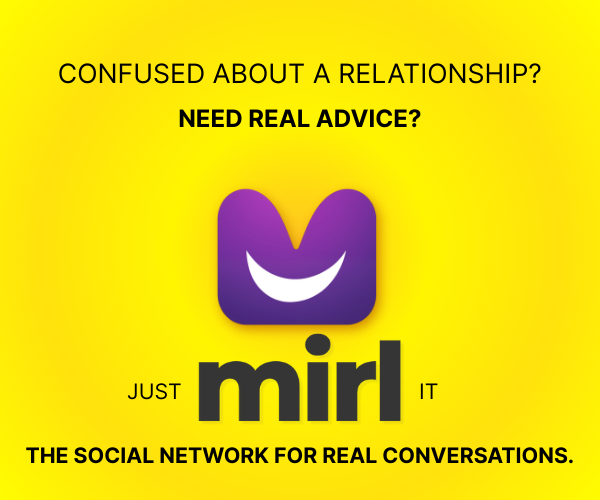How to Be Mean to People Without Turning Into a Mean Person

Some people think that learning to stand up for themselves is the same as learning how to be mean. But it’s not. Here are the steps to take to be strong.
If you want to be respected, sometimes you need to stand up for yourself and avoid becoming a doormat. And sometimes, that means learning how to be mean to people.
We’re told that if we’re mean, we’re nasty. We’re told that if we help others too much, we’re being taken advantage of because we don’t give ourselves the time we need.
It’s a hard balance to find, but it’s entirely possible to learn how to be mean without allowing it to change your character.
[Read: 16 reasons why people find it so easy to take you for granted]
Why should you learn how to be mean?
It might sound negative to talk about learning how to be mean, but sometimes it’s necessary. Being mean doesn’t always have to be a negative thing, provided you know when to use the skill and when not to.
You should not go around being mean to everyone all the time, because that means you’re a generally mean person and nobody likes that type of person! [Read: 23 signs of a genuinely mean person and why they’re so bitter about everything]
You should learn how to be mean because it helps you gain respect, it helps you settle for what you deserve and not for what you don’t deserve.
It helps people to look up to you and see that you’re able to stand up for yourself when you need to, but it also means that you’re able to be soft and gentle when you need to be too. [Read: How to say no, stand up for yourself, and feel awesome]
If you’re someone who is always helping others, that’s a great thing. But you need to find the balance which allows you to have time for yourself also. Always being there for everyone else means you’re not there for yourself.
It means you’re allowing yourself to suffer silently, and it means that others may see you as a doormat when you deserve to be someone who is tiptoed around, not stamped upon!
Learning how to be mean isn’t a negative thing. It’s a necessity, but it comes with one particular condition – you should learn how to know when the time is right to use your new skills and always know your motivation behind being mean. [Read: How to stand up for yourself without being run over by others]
What does being mean look like?
Being mean for the right reasons and for the wrong reasons look very different to one another. When you’re mean for the wrong reasons you’re nasty, toxic, and you have no real reason for your actions other than to cause hurt and pain to someone else.
However, when you learn how to be mean for the right reasons, the picture looks completely different.
Being mean for a positive reason looks like this:
– You stand tall and watch your posture
– Your body language is strong and positive
– You do not use words that are directed to hurt someone, and instead you use language which is firm and states your purpose
– You know the reasons why you are being mean in the first place because you don’t want to be taken advantage of
[Read: How to be dominant – 15 calm and easy ways to be the real alpha]
Why is it important to learn how to be mean in a positive way
In many ways, you’re not actually being mean by learning how to be mean for the right reasons, you’re being strong. Standing up for yourself isn’t something you do for the hell of it, it’s something you do because you have to.
If you avoid this every single time it’s necessary, you’re allowing others to take advantage of you. As a result, they’ll use you and hurt you without thinking about it. Basically, if you don’t stand up for yourself, others will be mean to you, but in a negative way.
Being mean for the right reasons means saying “no” when you need to, refusing to do something which another person wants you to do because it doesn’t fit in with your reasons or your time plan.
It means telling someone when they’re treating you badly and it means standing up for another person, e.g. standing up to a bully who is hurting someone else. It might also mean calling someone out when they’re acting badly in general.
Don’t assume saying ‘no’ makes you mean
As you can see, learning how to be mean for the right reasons isn’t actually mean at all, it’s doing the right thing. [Read: What makes someone a pushover and how to avoid being one]
The reason we assume it to be mean is that we’re so used to going along with what everyone else wants and needs, and we rarely give enough time or thought to ourselves.
As a result, we think that if we say “no” or tell someone when we don’t like what they’re doing, we’re being nasty or causing pain to another person. Of course, we’re not, we’re actually doing something which needs to be done in order to restore a balance. [Read: Friends use you? 20 signs a friend is a user and how to handle them]
Never allow being mean to change who you are
Learning how to be mean and standing up for yourself is fantastic and it will give you a great amount of confidence, but it also comes with one particular side effect – the risk of allowing it to change who you are for the better.
There are times when you can be mean and times when you shouldn’t be. There are times when you should be understanding, empathic, and gentle, and there are many times when you should be a little harder and firm. Understanding the right time for each approach is important. [Read: How to be firm but not hurt people’s feelings – The 20 golden rules you must know]
The likelihood is that when you start standing up for yourself and saying “no” at necessary times, you’ll feel a power rush. It’s quite heady and addictive and it can be that you want to do it more and more.
Of course, go for it when the time is right, but do not allow it to become an addiction that you crave. Power can be extremely dangerous when used too much or when used incorrectly in general.
How to know when to be mean and when to give in
The best advice is this – before you decide on your approach, i.e. whether you’re going to be mean or not, ask yourself whether there is real benefit in it or not. Would you like it if someone did the same to you? Would it be justified? Is there another approach, perhaps one that is better?
Ask yourself these questions and if you still feel that you need to actually show a harder, meaner side to your character on this occasion, go for it.
Once it’s done, take a deep breath and go back to your gentle self. You are not a nasty or negative person because you had to tell someone they were out of order, or you had to say “no” to something that another person asked you to do, or was coercing you to do against your will. You’re simply placing importance on your own time. [Read: 20 signs you’re a people pleaser and just don’t realize it]
The 12 steps to stand up for yourself and be mean when required
Learning how to be mean doesn’t equate to you being a generally mean or toxic person, it simply means that you know what you’re worth and you’re not ashamed to stand up for yourself and demand that respect when it’s not being shown to you.
So, here are the steps you need to take to stand up for yourself.
1. Be calm
When you are upset with someone, it’s easy to let your negative emotions take over. But you don’t want to do that – you want to be in control of your feelings.
So, you might need to cool down so you can be calm, logical, and rational when you stand up for yourself. [Read: How to get rid of nervousness and calm your mind wherever you are]
2. Gather your thoughts
As you are cooling down, get clear on the situation and gather your thoughts. When you are too emotional, the logical side of your brain shuts down. So, wait until you can think clearly again, and then make sure you are able to articulate what you want to say.
3. Get comfortable with confrontation
No one likes conflict or fighting. And if someone is being mean to you, then you either feel like running away or fighting back – that’s called the “fight or flight syndrome.”
Many people don’t like confrontation, but you need to learn how to be mean and to be comfortable with it so you can deal with it effectively.
4. Don’t be aggressive
If your instinct is to “fight” instead of removing yourself from the situation, then you need to make sure you are not aggressive.
You need to be assertive – which is standing up for yourself calmly and respectfully. Being aggressive, on the other hand, is negative and detrimental to any interaction. [Read: How to be assertive – 17 ways to speak your mind loud and clear]
5. Use “I” statements
When you are being assertive, you want to use “I” statements like “I need…” or “I feel…” Doing this will humanize you to the other person.
It also makes your communication more direct which leads to better discussion and more clarity. Stay away from saying “you” statements like, “You are mean…” because when you talk like that, you sound accusatory or patronizing.
6. Be a bit selfish
Most people think it’s bad to be selfish. But when you don’t stand up for yourself, you are letting the other person be selfish.
Love yourself enough to demand what you want, need, and deserve even if that means learning how to be mean. Everyone deserves to have their needs met, so it’s okay to be selfish sometimes. [Read: 34 important tips to fall in love with yourself and be a better YOU]
7. Learn to say no
If you have a problem saying “no,” then you need to learn how to do it. Maybe you think people will like you more if you always agree and give in to what they want you to do.
But if saying “yes” is bad for you, then learn to say no. Put yourself first. [Read: How to say no – stop pleasing people and feel awesome instead]
8. Be aware of your body language
Body language accounts for about 90% of the meaning of a message. So, if your words sound like you are standing up for yourself but your actions are saying you are scared, the person will believe your actions over your words.
As they say, “actions speak louder than words.” So have posture, eye contact, and gestures that say you are being assertive. [Read: The subtle body language moves to appear way more confident]
9. Set boundaries
When you let people walk all over you, it’s because you don’t have personal boundaries. They feel free to treat you as a doormat because you never drew the line that they couldn’t cross.
So, you need to do that, convey it to them, and remember to stick to your convictions and stand your ground. Remember, all of this isn’t just about learning how to be mean, it’s about teaching others how you want to be treated by them. [Read: How to set boundaries and guide others to treat you with respect]
10. Have expectations for others
Part of having personal boundaries is having expectations for other people’s behavior. You need to expect that they treat you kindly and with respect.
So, you need to tell them how you expect them to act and how to treat you. We teach people how to treat us, so make sure you teach them well. [Read: 20 healthy expectations in a relationship that define a good love life]
11. Love yourself
Standing up for yourself is all rooted in self-love. And no, it’s not arrogant to love yourself.
You need to know that you deserve love and respect from other people. Because once you believe it and demand it, then they will have no choice but to act accordingly.
12. Practice
As they say – practice makes perfect! You need to practice standing up for yourself until it becomes second nature.
It won’t be easy at first, but it’s better than learning how to be mean. Standing up for yourself isn’t mean – it’s good. So, do it as often as you need to. [Read: Martyr complex – Are you intentionally hurting yourself to feel like a martyr?]
Final thoughts on learning to be mean in a positive way
Everyone deserves respect, it’s a basic human right, but you do need to be sure that your demands for respect and attention are within balance with who you are and what you’ve done. You can’t demand respect from someone if you’re not showing the same to them. [Read: How to stop being selfish – 20 ways to stop using and hurting others]
Ask yourself these questions and explore your motivation before deciding. You shouldn’t go around being mean all the time, simply when you need to be.
This will give you that respect because people will know that you’re a good person, someone who is kind and approachable, but you’re also not someone who is going to take any rubbish or disrespect from anyone else too. That’s the sign of a strong person – someone who knows their worth. [Read: 24 truthful signs your friends don’t respect you or even care what you think right now]
Learning how to be mean and firm now and then isn’t something to be ashamed of, but it is something you should use sparingly and with caution.
Choosing the right time will create the maximum impact and will give you the respect that others may be lacking right now.
[Read: How to recognize an emotionally bully and learn to stand up to them]
Learning to say “no” when others are placing unnecessary demands upon your time is also something we should all be more comfortable doing, and if that takes learning how to be mean in order to tick that box, well, so be it.



















